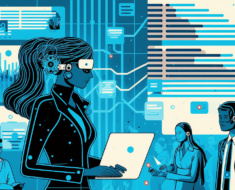
As artificial intelligence (AI) continues to advance at a rapid pace, it brings forth a myriad of ethical considerations and moral implications. The integration of AI into various aspects of our lives raises important questions about privacy, bias, transparency, accountability, and the potential impact on employment. It is crucial that we navigate these ethical challenges to ensure that AI is developed and deployed in a responsible and beneficial manner for society as a whole.
1. Ensuring Transparency and Accountability:
One key ethical concern surrounding AI is the need for transparency and accountability. AI systems often operate as black boxes, making it difficult to understand how they arrive at certain decisions or predictions. To address this issue, researchers and policymakers are emphasizing the importance of explainable AI (XAI). XAI aims to provide insights into AI’s decision-making process, enabling users to understand and question its outcomes. By promoting transparency and accountability, we can mitigate the risks of AI systems making biased or unethical decisions.
2. Tackling Bias and Fairness:
AI systems are trained on vast amounts of data, and if that data is biased or reflects societal inequalities, it can perpetuate and amplify those biases. This raises concerns about fairness and discrimination. It is crucial to address these biases by ensuring diverse and representative datasets and implementing fairness measures during the development and deployment of AI systems. Additionally, ongoing monitoring and evaluation of AI systems can help detect and rectify any biases that may arise.
3. Protecting Privacy and Data Ethics:
AI relies on vast amounts of data, often including personal and sensitive information. Safeguarding privacy and ensuring responsible data practices are essential. Striking a balance between data collection and usage for AI development while respecting individual privacy rights is a significant ethical challenge. Implementing robust data protection measures, informed consent protocols, and stringent data governance frameworks can help mitigate these concerns.
4. Addressing the Impact on Employment:
The rise of AI and automation has sparked concerns about the potential displacement of human workers. It is crucial to consider the ethical implications of AI-driven job displacement and to explore strategies for reskilling and upskilling the workforce. By prioritizing education and training programs that prepare individuals for the changing job landscape, we can ensure a just transition and minimize the negative impact on employment.
5. Global Collaboration and Regulation:
Given the global nature of AI development and deployment, international collaboration and regulation are essential. Establishing ethical standards and guidelines for AI on a global scale can help foster responsible development and prevent the misuse of AI technologies. It is crucial for governments, organizations, and experts to collaborate in shaping ethical frameworks that ensure the responsible and beneficial use of AI while safeguarding human rights and societal well-being.
As AI continues to shape our world, it is imperative to navigate the ethical challenges it presents. By promoting transparency, addressing bias, protecting privacy, and considering the impact on employment, we can ensure that AI is developed and deployed in a manner that aligns with ethical principles. Through global collaboration and the establishment of robust regulations, we can shape an AI-driven future that benefits all of humanity while upholding our moral values. Embracing the ethical dimensions of AI will be instrumental in harnessing its full potential for the betterment of society.
Dil Bole Oberoi





